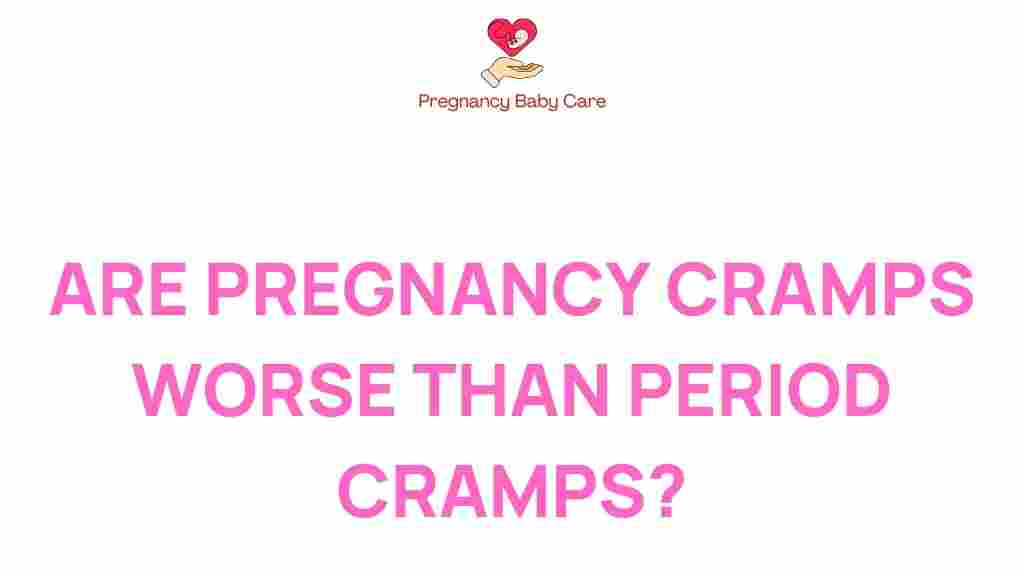Are Pregnancy Cramps More Intense Than Period Cramps?
Women often experience cramps at various stages of their reproductive lives, notably during menstruation and pregnancy. Understanding the differences between pregnancy cramps and period cramps is crucial for managing discomfort and knowing what to expect during these phases. This article will explore the symptoms, intensity, and management of cramps associated with both periods and pregnancy, offering valuable insights into women’s health.
Understanding Cramps: The Basics
Cramps are a common experience for many women, and they can manifest in different ways depending on the stage of life. Here’s a brief overview:
- Period Cramps: Also known as dysmenorrhea, these cramps occur just before and during menstruation. They are caused by the uterus contracting to shed its lining.
- Pregnancy Cramps: These cramps can occur early in pregnancy as the body adjusts to the developing embryo. They may also be due to implantation or the stretching of the uterus.
Symptoms of Pregnancy and Period Cramps
Recognizing the symptoms of each type of cramp can help women differentiate between them.
Symptoms of Period Cramps
- Throbbing or cramping pain in the lower abdomen
- Pain that may radiate to the lower back and thighs
- Nausea, headaches, or fatigue
- Symptoms typically last 1 to 3 days
Symptoms of Pregnancy Cramps
- Light, intermittent cramping in the lower abdomen
- Cramping may be accompanied by mild spotting
- Pain that can feel like a pulling sensation
- Symptoms may vary in intensity and can last throughout the first trimester
Intensity Comparison: Are Pregnancy Cramps More Intense Than Period Cramps?
The intensity of pregnancy cramps compared to period cramps varies from woman to woman. Generally, period cramps are often described as sharper and more intense, especially for those with severe dysmenorrhea. Women may experience:
- Period Cramps: These can range from mild discomfort to debilitating pain, often requiring pain management strategies.
- Pregnancy Cramps: Initially, these cramps can feel like a mild ache or pressure. As the pregnancy progresses, the stretching of the uterus can lead to more noticeable discomfort, though many find it less intense than period cramps.
Factors Influencing Cramps Intensity
Several factors can influence the intensity of cramps, whether during menstruation or pregnancy:
- Hormonal Changes: Fluctuations in hormones can affect how intense cramps feel.
- Individual Pain Threshold: Each woman has a different tolerance for pain, impacting her perception of cramping.
- Medical Conditions: Conditions like endometriosis or fibroids can exacerbate period cramps.
- Stage of Pregnancy: Early pregnancy cramps can be different from those experienced later on as the body undergoes various changes.
Pain Management Strategies
Managing discomfort is essential for women experiencing cramps. Here are some effective pain management strategies for both pregnancy cramps and period cramps:
Pain Management for Period Cramps
- Over-the-Counter Pain Relievers: Non-steroidal anti-inflammatory drugs (NSAIDs) like ibuprofen can alleviate pain.
- Heat Therapy: Applying a heating pad to the lower abdomen can provide relief.
- Exercise: Gentle exercise can release endorphins, which help reduce pain.
- Dietary Changes: Reducing caffeine and sugar intake may help lessen cramping.
Pain Management for Pregnancy Cramps
- Rest: Lying down and resting can help alleviate discomfort.
- Hydration: Staying hydrated can reduce the severity of cramps.
- Warm Baths: Taking a warm bath can relax the muscles and ease pain.
- Consult a Healthcare Provider: Always consult a healthcare provider before taking any medication during pregnancy.
When to Seek Medical Attention
While cramps are common during menstruation and pregnancy, certain symptoms warrant medical attention. Women should consider contacting a healthcare provider if they experience:
- Severe pain that doesn’t improve with home remedies
- Heavy bleeding or passing large clots
- Signs of infection, such as fever or chills
- Severe headaches or visual disturbances during pregnancy
Medical Insights on Cramps
Medical professionals emphasize the importance of understanding the body’s signals. Cramps can be a normal part of the reproductive cycle, but they can also indicate underlying health issues.
For those experiencing severe discomfort, medical professionals may recommend:
- Ultrasound: To check for abnormalities in the uterus.
- Blood Tests: To assess hormone levels and rule out conditions like ectopic pregnancy.
- Pain Management Plans: Customized strategies including medications and lifestyle changes.
Conclusion
In conclusion, while both pregnancy cramps and period cramps can be uncomfortable, they often differ in intensity and nature. Understanding your body’s signals is crucial for effective pain management and overall women’s health. If you experience abnormal symptoms or severe discomfort, it is essential to seek medical advice.
For further insights on women’s health and pain management, consider visiting this resource. Remember, knowledge is power, and being informed can help you navigate your reproductive health with confidence.
This article is in the category Pregnancy and created by PregnancyBabyCare Team
